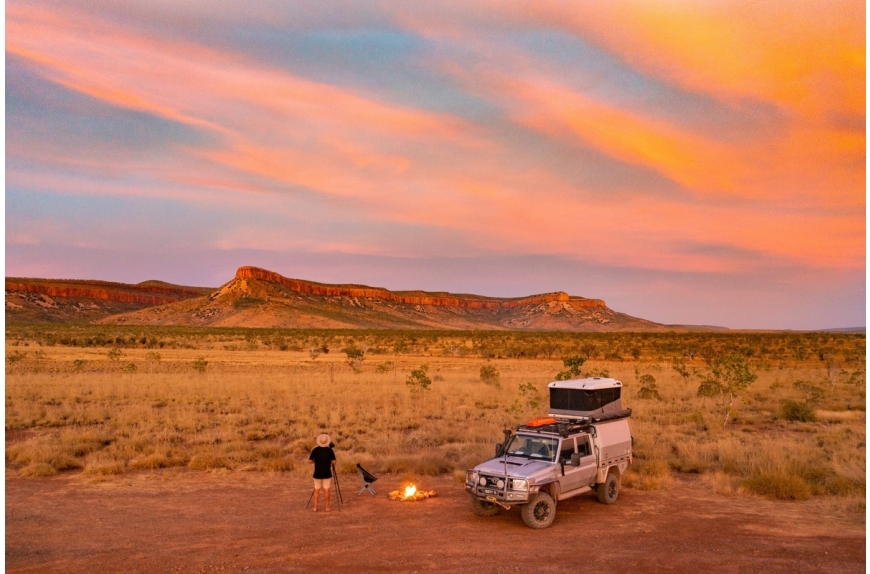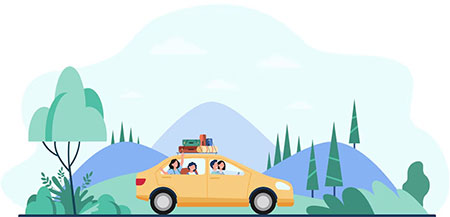
10 conseils pour un road trip en Australie
Partir en vacances en camping-car en Australie est pour la majorité des voyageurs une expérience nouvelle. Vous avez donc certainement de nombreuses questions sur cette formule de voyage qui vous apporte tant de liberté !
Vous trouverez ici 10 conseils pratiques pour un voyage réussi en camping-car.
Chaque camping-car a un agencement et un équipement bien particulier, donc en fonction de vos besoins il est important de bien choisir votre véhicule.
Par exemple : Si vous souhaitez faire beaucoup de camping sauvage, choisissez un véhicule avec une grande autonomie d’eau (grande citerne), filtre pour boire l’eau du robinet et panneaux solaires.
Si vous voyagez à deux adultes mais ne souhaitez pas faire et défaire votre lit tous les jours, choisissez un camping-car 4 couchages. Vous pouvez regarder directement sur notre site pour trouver votre véhicule idéal mais le mieux sera de nous demander directement ici
Chaque loueur propose des prestations différentes mais de manière générale le prix de la location comprend la location du véhicule, l'assurance standard avec une franchise entre 3000 et 8000AUD, l'équipement standard dans le véhicule soit la litterie, les ustensils de cuisine, serviette de bain et parfois un kit de départ (produit vaisselle, éponges, torchon).
Vous pouvez ensuite ajouter des options d'assurance pour réduire votre franchise ou couvrir des situations spécifiques et des options d'équipement suplémentaire comme siège enfant, table et chaises de camping, téléphone satelite, extra produit chimique pour les toilettes, ...
A noter que certains loueurs ont des "frais cachés" tels que certaines taxes, frais supplémentaires pour un conducteur en plus, cautions, remplissage de la bonbonne de gaz,… Il sera donc important de prendre tous ces frais en compte, car certains loueurs de camping-car qui paraissent moins chers au premier abord peuvent en réalité revenir beaucoup plus cher.
N’hésitez pas à demander conseil à notre équipe, on pourra vous aider dans votre comparaison.
Cette question revient très souvent. Si vous souhaitez passer des vacances en toute sérénité la réponse est OUI vous avez besoin d’une assurance mais maintenant laquelle est la mieux adaptée ?
3 options s’offrent à vous :
L’assurance de votre carte de paiement (Visa, MasterCard, Amex, …). Cette option ne fonctionne pas la mplus part du temps car le véhicule loué fait souvent plus de 3.5T ou plus de 8m3. A vous de vérifier avec votre banque quelles sont les conditions d’assurance.
Votre assurance complémentaire de voyage. Certaines assurances couvrent, en plus des éléments standards (rapatriement, maladie, …) la franchise en cas d’accident. En revanche, vous serez débité par le loueur du montant de cette franchise, et remboursé par l’assurance seulement quelques jours ou semaines plus tard. Ceci peut être une option si vous pouvez vous permettre d’avancer la franchise du véhicule loué pendant cette période
L’assurance du loueur de camping-car. C'est souvent la plus pratique. Il y a différent tiers pour cette assurance en fonction du "niveau de couverture" que vous souhaitez. Par exemple l'assurance "all inclusive" inclus le rachat total de la franchise et généralement la majorité des options payantes.
Voyager en camping-car en Australie, c’est comme louer un appartement meublé pour ses vacances. Les véhicules sont entièrement équipés. Vous y trouverez tout l’équipement d’une cuisine standard, tels que couverts, ustensiles de cuisine, torchons, tire-bouchon, passoire, verres à eau, verres à vins, casseroles, bouilloire, cafetière à piston, grille-pain, …
Vous avez aussi les draps, couvertures, duvets, cintres, pinces à linge, serviettes de bain, ...
Vous n’avez donc qu’à prendre vos habits et effets personnels.
Pour faciliter le rangement, utilisez un sac souple et non une grosse valise rigide qui sera difficile à ranger.
N’oubliez pas d’emporter votre permis de conduire international (vous pouvez l’obtenir à la préfecture gratuitement) ou une traduction certifiée en anglais.
Munissez-vous aussi d’un adaptateur pour les prises, d'une torche, d'une serviette de plage, de lunettes de soleil et d'une trousse à pharmacie (crème solaire, Biaffine, lotion anti-moustique).
Si maintenant il vous manque quelques équipements, vous trouvez facilement des magasins de campings et bricolage à travers le pays.
Voyager en camping-car offre une flexibilité sans comparaison avec les autres options de voyage. Vous pouvez en fonction de vos envies, de la météo, des autres voyageurs, choisir de rester plus longtemps à un endroit ou lever le camp plus tôt. Mais quels sont ces endroits magiques où vous pouvez établir votre petit coin de paradis ?
Il existe plusieurs options de camping :
La première et la plus connue est le camping traditionnel. Vous payez par nuitée un emplacement pour votre véhicule et pour les voyageurs. Dans ces campings, vous pouvez vous brancher à une borne et recharger la batterie de votre camping-car, vider vos eaux usées et remplir la citerne d’eau douce. Ce sont des campings privés avec des infrastructures et un emplacement plus ou moins bon en fonction de son nombre d’étoiles.
Le camping sauvage: Il n'est pas possible de faire du camping sauvage. Il y a des règles à respecter pour le camping en Australie. Chaque état à ses propres règles. Certains états sont plus souple que d'autres et en fonction du lieu dans l'état dans lequel vous voyagez, la ville ou commune peut ajouter sa propre réglementation. Nous recommandons fortement de demander à l'office du tourisme local si il y a des zones de "free camping" pour éviter les amendes qui sont assez salées si vous passez la nuit dans une zone interdite pour cela.
Maintenant tout n'est pas perdu, il y a pleins d'options de campings qui sont gratuites et dans la nature.
https://www.detouroz.com/fr/australie/le-camping-en-australie/Même si les camping-cars sont faciles à manœuvrer et à conduire, il faut toujours se rappeler que vous n’êtes pas dans un véhicule de gabarit et de poids similaire à une voiture de tourisme. Voici quelques conseils pour vous faciliter la conduite dans le pays:
- La conduite est à gauche, mais le conducteur est toujours situé «au milieu de la route »
- Ayez toujours en tête la hauteur de votre véhicule, surtout lorsque vous vous garez sous des arbres ou abris.
- La limitation de vitesse est de 100km/h maximum en fonction des Etats. Evitez quand même de vous presser, et profitez des beautés du grand continent, la route fait partie intégrante de votre séjour.
- Soyez attentif lorsque un poids lourd vous dépasse, la « gifle » est beaucoup plus ressentie en camping-car.
- Ne soyez pas surpris si sur des routes à plusieurs voies un véhicule vous double sur la gauche.
- Regardez ce qui se passe sur la route devant, et non qui vous suit derrière.
- Laissez passer les véhicules qui sont derrière vous seulement si vous jugez la manœuvre non dangereuse.
- Anticipez les actions des autres véhicules. La distance de freinage et d’accélération en camping-car est plus longue.
- Respectez et rallongez les distances de sécurité.
- Roulez si possible pendant la journée pour éviter les mauvaises surprises.
La conduite du camping-car est relativement facile, vous vous habituerez très rapidement.
En ville, par contre, cela peut devenir plus compliqué dans la mesure où il y a plus de monde et moins d’espace.
Nous vous conseillons donc de ne pas faire de créneaux en ville, et de privilégier des emplacements payants où vous ne devrez pas trop manœuvrer. Généralement, vous ne pourrez pas camper dans les villes, il est plus indiqué de sortir légèrement des grandes agglomérations ou d’aller dans les campings de la ville.
Lorsque vous utilisez un camping-car, il est important d’être responsable et d’adopter le bon comportement lorsque vous videz vos toilettes et eaux usées. Vous devez toujours utiliser les stations d’épuration prévues à cet effet.
C’est très important pour l’environnement en Australie.
Les stations d’épuration sont localisées dans la plupart des campings Big 4, ou dans les principales villes et villages.
Vous pouvez trouver toutes les stations de vidange sur l'aplication wikicamps.
Avant de prendre la route pour partir pour de nouvelles aventures, n’oubliez pas de toujours vérifier que les accessoires (intérieurs et extérieurs) dans le camping-car soient bien rangés et ne bougent pas, afin qu'ils ne se retrouvent pas à terre au premier virage. Verrouillez les placards, portes intérieures et la porte du réfrigérateur.
Dans le même ordre d’idée, si vous utilisez votre cable électrique, assurez-vous qu’il soit débranché et bien rangé dans votre camping-car avant de prendre la route.
Même chose pour la bonbonne de gaz, assurez-vous bien qu'elle soit fermée au moment du départ.
Et enfin, pour éviter que les verres et assiettes ne se touchent et provoquent un petit bruit qui peut devenir désagréable lorsque vous roulez, il vous suffira de mettre une feuille d'essuie-tout entre les ustensiles et le tour sera réglé !
L'avantage de partir en vacances en camping-car est d'être le plus autonome possible, de pouvoir dormir où l'on veut et quand on veut sans penser au niveau de la batterie, de la citerne d'eau fraîche et de la citerne des eaux usées.
Voilà quelques conseils qui vous permettrons de rester plus longtemps hors des campings et plus loin des sentiers battus:
- Levez-vous tôt et couchez-vous tôt, vous utiliserez moins d'électricité en soirée.
- Allumez seulement les lumières si nécessaire.
- Eteignez l'alimentation du refrigérateur la nuit.
- Ayez un ou deux repas qui peuvent se cuisiner sans gaz et sans électricité.
- Pour faire la vaisselle, remplissez l'évier et utilisez la même eau pour laver et rincer (la façon australienne).
- Pour les plus routards, une douche tous les 2 jours suffit.
- Lorsque vous faites le plein d'eau fraiche, n'oubliez surtout pas de vider les eaux usées en même temps même si la cuve n'est pas pleine.
- Utilisez les toilettes publiques lorsque c'est possible.



